|
Library Bulletins |
|
- Home > Library Bulletins > Recent Addition, May 2018
|

Recent Addition, May 2018| 1. Institutional capacity for climate change response: a new approach to climate politics / Scavenius, Theresa Ed. and Rayner , Steve - London: Routledge, 2018 |  Abstract: In a period of rapid climate change and climate governance failures, it is crucial to understand and address how effectively different political institutions can and should react to climate change. The term 'institutional response capacity' can be defined as a measurement for how effective political institutions may respond to threats and challenges such as climate change. This book sets out to provide a venue for the discussion of how to conduct climate politics by offering new perspectives on how social and political institutions are capable of responding to climate change. In doing so, the book explores how democracy, institutional design and polycentric governance influence social and political entities’ capacity to mitigate, adapt, address and transform climate change. The book offers building blocks for a new agenda of climate studies by focusing on institutional response capacity and by offering a new approach to climate governance at a time when many political initiatives have failed. Abstract: In a period of rapid climate change and climate governance failures, it is crucial to understand and address how effectively different political institutions can and should react to climate change. The term 'institutional response capacity' can be defined as a measurement for how effective political institutions may respond to threats and challenges such as climate change. This book sets out to provide a venue for the discussion of how to conduct climate politics by offering new perspectives on how social and political institutions are capable of responding to climate change. In doing so, the book explores how democracy, institutional design and polycentric governance influence social and political entities’ capacity to mitigate, adapt, address and transform climate change. The book offers building blocks for a new agenda of climate studies by focusing on institutional response capacity and by offering a new approach to climate governance at a time when many political initiatives have failed. | | 2. Israel's foreign policy beyond the Arab world: engaging the periphery / Samaan, Jean-Loup - London: Routledge, 2018 | 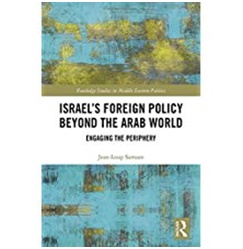 Abstract: For over 60 years, Israel’s foreign policy establishment has looked at its regional policy through the lens of a geopolitical concept named "the periphery doctrine." The idea posited that due to the fundamental hostility of neighboring Arab countries, Israel ought to counterbalance this threat by engaging with the "periphery" of the Arab world through clandestine diplomacy. Based on original research in the Israeli diplomatic archives and interviews with key past and present decision-makers, this book shows that this concept of a periphery was, and remains, a core driver of Israel’s foreign policy. The periphery was borne out of the debates among Zionist circles concerning the geopolitics of the nascent Israeli State. The evidence from Israel’s contemporary policies shows that these principles survived the historical relationships with some countries (Iran, Turkey, Ethiopia) and were emulated in other cases: Azerbaijan, Greece, South Sudan, and even to a certain extent in the attempted exchanges by Israel with Gulf Arab kingdoms. Abstract: For over 60 years, Israel’s foreign policy establishment has looked at its regional policy through the lens of a geopolitical concept named "the periphery doctrine." The idea posited that due to the fundamental hostility of neighboring Arab countries, Israel ought to counterbalance this threat by engaging with the "periphery" of the Arab world through clandestine diplomacy. Based on original research in the Israeli diplomatic archives and interviews with key past and present decision-makers, this book shows that this concept of a periphery was, and remains, a core driver of Israel’s foreign policy. The periphery was borne out of the debates among Zionist circles concerning the geopolitics of the nascent Israeli State. The evidence from Israel’s contemporary policies shows that these principles survived the historical relationships with some countries (Iran, Turkey, Ethiopia) and were emulated in other cases: Azerbaijan, Greece, South Sudan, and even to a certain extent in the attempted exchanges by Israel with Gulf Arab kingdoms. | | 3. The Japanese empire: grand strategy from the meiji restoration to the pacific war / by Paine, S.C.M. - New York: Cambridge University Press, 2017 |  Abstract: The Japanese experience of war from the late-nineteenth to the mid-twentieth century presents a stunning example of the meteoric rise and shattering fall of a great power. As Japan modernized and became the one non-European great power, its leaders concluded that an empire on the Asian mainland required the containment of Russia. Japan won the First Sino-Japanese War (1894-5) and the Russo-Japanese War (1904-5) but became overextended in the Second Sino-Japanese War (1931-45), which escalated, with profound consequences, into World War II. A combination of incomplete institution building, an increasingly lethal international environment, a skewed balance between civil and military authority, and a misunderstanding of geopolitics explains these divergent outcomes. This analytical survey examines themes including the development of Japanese institutions, diversity of opinion within the government, domestic politics, Japanese foreign policy and China's anti-Japanese responses. Abstract: The Japanese experience of war from the late-nineteenth to the mid-twentieth century presents a stunning example of the meteoric rise and shattering fall of a great power. As Japan modernized and became the one non-European great power, its leaders concluded that an empire on the Asian mainland required the containment of Russia. Japan won the First Sino-Japanese War (1894-5) and the Russo-Japanese War (1904-5) but became overextended in the Second Sino-Japanese War (1931-45), which escalated, with profound consequences, into World War II. A combination of incomplete institution building, an increasingly lethal international environment, a skewed balance between civil and military authority, and a misunderstanding of geopolitics explains these divergent outcomes. This analytical survey examines themes including the development of Japanese institutions, diversity of opinion within the government, domestic politics, Japanese foreign policy and China's anti-Japanese responses. | | 4. Japan's foreign relations in Asia / Brown, James D.J. Ed. and Kingston, Jeff - London: Routledge, 2018 |  Abstract: Japan's Foreign Relations in Asia has been specifically designed to introduce students to Japan’s foreign relations in Asia since 1990, a period in which there have been dramatic developments in Japan, including the reinterpretation of the Constitution and expanded US–Japan defence cooperation. The geopolitical dynamics and implications of these new developments are profound and underscore the need for a new textbook on this subject. Covering not only the key regional players of China and the Koreas, this textbook also encompasses chapters on Japan’s relations with India, Myanmar, Indonesia, Vietnam, the Philippines and Thailand, along with its multilateral engagement and initiatives. Abstract: Japan's Foreign Relations in Asia has been specifically designed to introduce students to Japan’s foreign relations in Asia since 1990, a period in which there have been dramatic developments in Japan, including the reinterpretation of the Constitution and expanded US–Japan defence cooperation. The geopolitical dynamics and implications of these new developments are profound and underscore the need for a new textbook on this subject. Covering not only the key regional players of China and the Koreas, this textbook also encompasses chapters on Japan’s relations with India, Myanmar, Indonesia, Vietnam, the Philippines and Thailand, along with its multilateral engagement and initiatives. | | 5. Japan's search for strategic security partnership / Khandekar, Gauri Ed. and Gaens, Bart - London: Routledge, 2018 |  Abstract: As tensions between China and Japan increase, including over the disputed islands in the East China Sea, Japan has adopted under Prime Minister Abe a new security posture. This involves, internally, adapting Japan’s constitutional position on defence and, externally, building stronger international relationships in the Asia-Pacific region and more widely. This book presents a comprehensive analysis of these developments. It shows how trust and co-operation with the United States, the only partner with which Japan has a formal alliance, is being rebuilt, discusses how other relationships, both on security and on wider issues, are being formed, in the region and with European countries and the EU, with the relationships with India and Australia being of particular importance, and concludes by assessing the likely impact on the region of Japan’s changing posture and new relationships. Abstract: As tensions between China and Japan increase, including over the disputed islands in the East China Sea, Japan has adopted under Prime Minister Abe a new security posture. This involves, internally, adapting Japan’s constitutional position on defence and, externally, building stronger international relationships in the Asia-Pacific region and more widely. This book presents a comprehensive analysis of these developments. It shows how trust and co-operation with the United States, the only partner with which Japan has a formal alliance, is being rebuilt, discusses how other relationships, both on security and on wider issues, are being formed, in the region and with European countries and the EU, with the relationships with India and Australia being of particular importance, and concludes by assessing the likely impact on the region of Japan’s changing posture and new relationships. | | 6. Kurdistan: the quest for representation and self-determination / Riamei, Lungthuiyang - New Delhi: KW Publishers, 2018 | 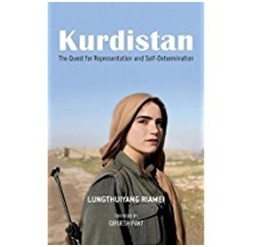 Abstract: Kurdistan, the name given to the Kurds’ historical homeland, is a landlocked region that lies at the crossroads of Turkey, Syria, Iraq and Iran. After the fall of Ottoman Empire the Kurdish people were promised independence by the treaty of Sevres in 1920. The Kurds are known as a nation without borders and consider as a stateless people. Aftermath of the Arab Spring in 2010, Kurdistan has witnessed an increase in nationalism and a shift in geo-politics. The book examines the various models which could be acceptable solution to the Kurdish problem in West Asian region. It also evaluates the role of the Kurdish diaspora placing Kurdish issue in the international forum. The Kurdish Peshmerga and YPG militia maintains one of the strongest forces confronting against the ISIS in West Asian region. Abstract: Kurdistan, the name given to the Kurds’ historical homeland, is a landlocked region that lies at the crossroads of Turkey, Syria, Iraq and Iran. After the fall of Ottoman Empire the Kurdish people were promised independence by the treaty of Sevres in 1920. The Kurds are known as a nation without borders and consider as a stateless people. Aftermath of the Arab Spring in 2010, Kurdistan has witnessed an increase in nationalism and a shift in geo-politics. The book examines the various models which could be acceptable solution to the Kurdish problem in West Asian region. It also evaluates the role of the Kurdish diaspora placing Kurdish issue in the international forum. The Kurdish Peshmerga and YPG militia maintains one of the strongest forces confronting against the ISIS in West Asian region. | | 7. The Kurdish Question revisited / Stansfield, Gareth Ed. and Shareef, Mohammed - London: Hurst & Company, 2017 | 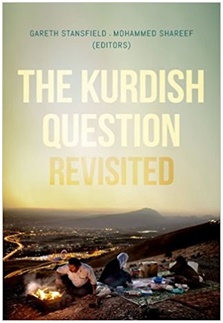 Abstract: The Kurds, once marginal in the study of the Middle East and secondary in its international relations, have moved to centre stage in recent years. The contributors to The Kurdish Question Revisited offer insights into how this once seemingly intractable, immutable phenomenon is being transformed amid the new political realities of the Middle East. Abstract: The Kurds, once marginal in the study of the Middle East and secondary in its international relations, have moved to centre stage in recent years. The contributors to The Kurdish Question Revisited offer insights into how this once seemingly intractable, immutable phenomenon is being transformed amid the new political realities of the Middle East. | | 8. Limited war in South Asia: from decolonization to recent times / Gates, Scott and Roy, Kaushik - London: Routledge, 2018 |  Abstract: This book examines the origins, courses and consequences of conventional wars in post-colonial South Asia. Although South Asia has experienced large-scale conventional warfare on several occasions since the end of World War II, there is an almost total neglect of analysis of conventional warfare in the Indian subcontinent. Focusing on China, India and Pakistan, this volume, therefore, takes a unique approach. Regional rivalries between India and Pakistan are linked with global rivalries between the US and USSR (later Russia) and then China, and war is defined in a broader perspective. The book analyses the conduct of land, sea and air warfare, as well as the causes and consequences of conflicts. Tactical conduct of warfare (the nature of mobile armoured strikes and static linear infantry combat supported by heavy artillery) and generalship are studied along with military strategy, doctrine and grand strategy (national security policy), which is an amalgam of diplomacy, military strategy and economic policy. Abstract: This book examines the origins, courses and consequences of conventional wars in post-colonial South Asia. Although South Asia has experienced large-scale conventional warfare on several occasions since the end of World War II, there is an almost total neglect of analysis of conventional warfare in the Indian subcontinent. Focusing on China, India and Pakistan, this volume, therefore, takes a unique approach. Regional rivalries between India and Pakistan are linked with global rivalries between the US and USSR (later Russia) and then China, and war is defined in a broader perspective. The book analyses the conduct of land, sea and air warfare, as well as the causes and consequences of conflicts. Tactical conduct of warfare (the nature of mobile armoured strikes and static linear infantry combat supported by heavy artillery) and generalship are studied along with military strategy, doctrine and grand strategy (national security policy), which is an amalgam of diplomacy, military strategy and economic policy. | | 9. The limits of the land: how the struggle for the west bank shaped the Arab-Israeli conflict / Rubin, Avshalom - Bloomington: Indian University Press, 2017 | 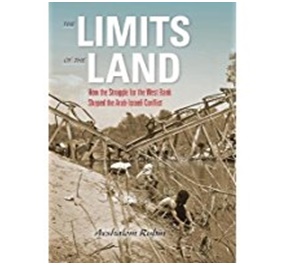 Abstract: Was Israel’s occupation of the West Bank inevitable? From 1949-1967, the West Bank was the center of the Arab-Israeli conflict. Many Israelis hoped to conquer it and widen their narrow borders, while many Arabs hoped that it would serve as the core of a future Palestinian state. In The Limits of the Land, Avshalom Rubin presents a sophisticated new portrait of the Arab-Israeli struggle that goes beyond partisan narratives of the past. Drawing on new evidence from a wide variety of sources, many of them only recently declassified, Rubin argues that Israel’s leaders indeed wanted to conquer the West Bank, but not at any cost. By 1967, they had abandoned hope of widening their borders and adopted an alternative strategy based on nuclear deterrence. In 1967, however, Israel’s new strategy failed to prevent war, convincing its leaders that they needed to keep the territory they conquered. The result was a diplomatic stalemate that endures today. Abstract: Was Israel’s occupation of the West Bank inevitable? From 1949-1967, the West Bank was the center of the Arab-Israeli conflict. Many Israelis hoped to conquer it and widen their narrow borders, while many Arabs hoped that it would serve as the core of a future Palestinian state. In The Limits of the Land, Avshalom Rubin presents a sophisticated new portrait of the Arab-Israeli struggle that goes beyond partisan narratives of the past. Drawing on new evidence from a wide variety of sources, many of them only recently declassified, Rubin argues that Israel’s leaders indeed wanted to conquer the West Bank, but not at any cost. By 1967, they had abandoned hope of widening their borders and adopted an alternative strategy based on nuclear deterrence. In 1967, however, Israel’s new strategy failed to prevent war, convincing its leaders that they needed to keep the territory they conquered. The result was a diplomatic stalemate that endures today. | | 10. Latin America since the left turn / Falleti, Tulia G. Ed. and Parrado, Emilio A. - Philadelphia: University of Pennsylvania Press, 2018 |  Abstract: In the early twenty-first century, the citizens of many Latin American countries, such as Argentina, Bolivia, Brazil, Ecuador, and Venezuela, elected left-wing governments, explicitly rejecting and attempting to reverse the policies of neoliberal structural economic adjustment that had prevailed in the region during the 1990s. However, in other countries such as Chile, Colombia, Mexico, and Peru continuity and even extension of the neoliberal agenda have been the norm. What were the consequences of rejecting the neoliberal consensus in Latin America? Why did some countries stay on the neoliberal course? Contributors to Latin America Since the Left Turn address these questions and more as they frame the tensions and contradictions that currently characterize Latin American societies and politics. Divided into three sections, the book begins with an examination of the political economy, from models of development, to taxation and spending patterns, to regionalization of trade and human migration. The second section analyzes the changes in democracy and political identities. The last part explores the themes of citizenship, constitutionalism, and new forms of civic participation. Abstract: In the early twenty-first century, the citizens of many Latin American countries, such as Argentina, Bolivia, Brazil, Ecuador, and Venezuela, elected left-wing governments, explicitly rejecting and attempting to reverse the policies of neoliberal structural economic adjustment that had prevailed in the region during the 1990s. However, in other countries such as Chile, Colombia, Mexico, and Peru continuity and even extension of the neoliberal agenda have been the norm. What were the consequences of rejecting the neoliberal consensus in Latin America? Why did some countries stay on the neoliberal course? Contributors to Latin America Since the Left Turn address these questions and more as they frame the tensions and contradictions that currently characterize Latin American societies and politics. Divided into three sections, the book begins with an examination of the political economy, from models of development, to taxation and spending patterns, to regionalization of trade and human migration. The second section analyzes the changes in democracy and political identities. The last part explores the themes of citizenship, constitutionalism, and new forms of civic participation. | | 11. Landscapes of the Jihad: militancy morality modernity / Devji, Faisal - London: Hurst & Company, 2017 | 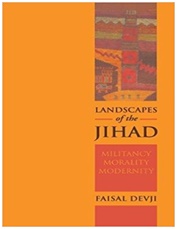 Abstract: What are the motives behind Osama bin Laden's and Al-Qaeda's jihad against America and the West? Innumerable attempts have been made in recent years to explain that mysterious worldview. In Landscapes of the Jihad, Faisal Devji focuses on the ethical content of this jihad as opposed to its purported political intent. Al-Qaeda differs radically from such groups as Egypt's Muslim Brotherhood and Indonesia's Jemaah Islamiyah, which aim to establish fundamentalist Islamic states. In fact, Devji contends, Al-Qaeda, with its decentralized structure and emphasis on moral rather than political action, actually has more in common with multinational corporations, antiglobalization activists, and environmentalist and social justice organizations. Bin Laden and his lieutenants view their cause as a response to the oppressive conditions faced by the Muslim world rather than an Islamist attempt to build states. Al-Qaeda culls diverse symbols and fragments from Islam's past in order to legitimize its global war against the "metaphysical evil" emanating from the West. Abstract: What are the motives behind Osama bin Laden's and Al-Qaeda's jihad against America and the West? Innumerable attempts have been made in recent years to explain that mysterious worldview. In Landscapes of the Jihad, Faisal Devji focuses on the ethical content of this jihad as opposed to its purported political intent. Al-Qaeda differs radically from such groups as Egypt's Muslim Brotherhood and Indonesia's Jemaah Islamiyah, which aim to establish fundamentalist Islamic states. In fact, Devji contends, Al-Qaeda, with its decentralized structure and emphasis on moral rather than political action, actually has more in common with multinational corporations, antiglobalization activists, and environmentalist and social justice organizations. Bin Laden and his lieutenants view their cause as a response to the oppressive conditions faced by the Muslim world rather than an Islamist attempt to build states. Al-Qaeda culls diverse symbols and fragments from Islam's past in order to legitimize its global war against the "metaphysical evil" emanating from the West. | | 12. Maritime security risks, vulnerabilities and cooperation: uncertainty in the Indian ocean / Cordner, Lee - New York: Palgarve Macmillan, 2018 | 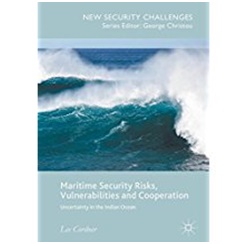 Abstract: This book uniquely employs risk and vulnerability approaches to advocate international policy options for enhancing maritime security cooperation in the Indian Ocean region. Understanding shared risks and common vulnerabilities that impact the achievement of mutual objectives in the oceanic domain present practical bases for progressing collective action. The Indian Ocean sea lanes are the world’s most important thoroughfares for energy resources (oil, gas and coal) and other cargoes. Secure maritime trade routes are vital to global, regional and national economies. Further, security challenges resulting from marine environmental degradation impacted by climate change are rising. Regional and extra-regional actors need to work more closely together to impose law and order at sea, control regional conflicts, respond to humanitarian crises and natural disasters, and conserve the marine environment. This book provides an invaluable resource for political leaders, policy advisers, academic researchers, military professionals, and students of international security and strategic studies. Abstract: This book uniquely employs risk and vulnerability approaches to advocate international policy options for enhancing maritime security cooperation in the Indian Ocean region. Understanding shared risks and common vulnerabilities that impact the achievement of mutual objectives in the oceanic domain present practical bases for progressing collective action. The Indian Ocean sea lanes are the world’s most important thoroughfares for energy resources (oil, gas and coal) and other cargoes. Secure maritime trade routes are vital to global, regional and national economies. Further, security challenges resulting from marine environmental degradation impacted by climate change are rising. Regional and extra-regional actors need to work more closely together to impose law and order at sea, control regional conflicts, respond to humanitarian crises and natural disasters, and conserve the marine environment. This book provides an invaluable resource for political leaders, policy advisers, academic researchers, military professionals, and students of international security and strategic studies. | | 13. Neoliberal turkey and its discontents: economics policy and the environment under erdogan / Adaman, Fikret Ed. - London: I. B. Tauris, 2017 |  Abstract: The 'neoliberal' economic policy of Erdogan's AKP Party, which has delivered extraordinary growth to Turkish GDP over the last decade, has been one of the foundations of the party's popular appeal. Here, a group of influential Turkish economists show how these policies have also had a detrimental impact on the environment, sustainability and the long-term health of the Turkish economy. Analysing and dissecting the relationship between construction, the environment and economic growth under President Erdogan, Neoliberal Turkey and its Discontents will make an important contribution to debates around the economic growth of Turkey and the future of the AKP economic plan. Abstract: The 'neoliberal' economic policy of Erdogan's AKP Party, which has delivered extraordinary growth to Turkish GDP over the last decade, has been one of the foundations of the party's popular appeal. Here, a group of influential Turkish economists show how these policies have also had a detrimental impact on the environment, sustainability and the long-term health of the Turkish economy. Analysing and dissecting the relationship between construction, the environment and economic growth under President Erdogan, Neoliberal Turkey and its Discontents will make an important contribution to debates around the economic growth of Turkey and the future of the AKP economic plan. | | 14. Non-state actors in international law / Noortmann, Math Ed. - UK: Hart Publishing, 2017 | 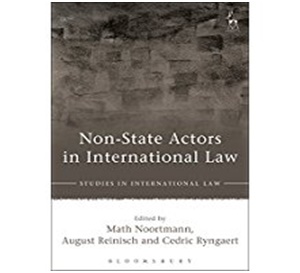 Abstract: The role and position of non-State actors in international law is the subject of a longstanding and intensive scholarly debate. This handbook explores the participation of this new category of actors in an international legal system that has historically been dominated by States. It explores the most important issues, actors, and theoretical approaches, with respect to these new participants in international law. The book provides the reader with a comprehensive and state-of-the-art overview of the most important legal and political developments and perspectives. The relevant non-State actors discussed include international governmental organizations, international NGOs, multinational companies, investors, and armed opposition groups. Their legal position is considered in relation to specific issue-areas, such as humanitarian law, human rights, the use of force, and international responsibility. Abstract: The role and position of non-State actors in international law is the subject of a longstanding and intensive scholarly debate. This handbook explores the participation of this new category of actors in an international legal system that has historically been dominated by States. It explores the most important issues, actors, and theoretical approaches, with respect to these new participants in international law. The book provides the reader with a comprehensive and state-of-the-art overview of the most important legal and political developments and perspectives. The relevant non-State actors discussed include international governmental organizations, international NGOs, multinational companies, investors, and armed opposition groups. Their legal position is considered in relation to specific issue-areas, such as humanitarian law, human rights, the use of force, and international responsibility. | | 15. Oman: politics and society n the Qaboos state / Valeri, Marc Marc Valeri - London: Hurst & Company, 2017 |  Abstract: When Sultan Qaboos overthrew his father as ruler of the Persian Gulf state of Oman in 1970, with the help of British advisers, few expected him to survive long. He was unknown to his own population, and the country was poor and plagued by civil wars. Yet he has built his regime's legitimacy on a policy of national unification, the assimilation of all of Oman to the oil rentier state framework, and of his state to the person of the sultan, the incarnation of the country's "renaissance." This books seeks to understand the mechanisms of social and political perpetuation of authoritarianism in post-colonial states such as Oman. It shows how one monarchical power has built and constantly renewed its basis to meet the internal and external challenges threatening its stability. Yet this book also raises the question of what happens when one part of this model, namely an oil-rent economy, falters, with half the population under fifteen years of age and when the privileges enjoyed till recently may no longer be tenable. Valeri also sheds light on the strategies adopted and challenges faced by other Arab monarchies in the Persian Gulf, Morocco and Jordan. Abstract: When Sultan Qaboos overthrew his father as ruler of the Persian Gulf state of Oman in 1970, with the help of British advisers, few expected him to survive long. He was unknown to his own population, and the country was poor and plagued by civil wars. Yet he has built his regime's legitimacy on a policy of national unification, the assimilation of all of Oman to the oil rentier state framework, and of his state to the person of the sultan, the incarnation of the country's "renaissance." This books seeks to understand the mechanisms of social and political perpetuation of authoritarianism in post-colonial states such as Oman. It shows how one monarchical power has built and constantly renewed its basis to meet the internal and external challenges threatening its stability. Yet this book also raises the question of what happens when one part of this model, namely an oil-rent economy, falters, with half the population under fifteen years of age and when the privileges enjoyed till recently may no longer be tenable. Valeri also sheds light on the strategies adopted and challenges faced by other Arab monarchies in the Persian Gulf, Morocco and Jordan. | | 16. Optimizing cyberdeterrence: a comprehensive strategy for preventing foreign cyberattacks / Mandel, Robert - Washington: Georgetown University Press, 2017 | 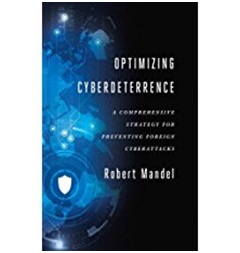 Abstract: Robert Mandel offers a unique and comprehensive strategic vision for how governments, in partnership with the private sector, can deter cyberattacks from both nonstate and state actors. Cyberdeterrence must be different from conventional military or nuclear deterrence, which are mainly based on dissuading an attack by forcing the aggressor to face unacceptable costs. In the cyber realm, where attributing a specific attack to a specific actor is extremely difficult, conventional deterrence principles are not enough. Mandel argues that cyberdeterrence must alter a potential attacker's decision calculus by not only raising costs for the attacker but also by limiting the prospects for gain. Cyberdeterrence must also involve indirect unorthodox restraints, such as exposure to negative blowback and deceptive diversionary measures, and cross-domain measures rather than just retaliation in kind. Abstract: Robert Mandel offers a unique and comprehensive strategic vision for how governments, in partnership with the private sector, can deter cyberattacks from both nonstate and state actors. Cyberdeterrence must be different from conventional military or nuclear deterrence, which are mainly based on dissuading an attack by forcing the aggressor to face unacceptable costs. In the cyber realm, where attributing a specific attack to a specific actor is extremely difficult, conventional deterrence principles are not enough. Mandel argues that cyberdeterrence must alter a potential attacker's decision calculus by not only raising costs for the attacker but also by limiting the prospects for gain. Cyberdeterrence must also involve indirect unorthodox restraints, such as exposure to negative blowback and deceptive diversionary measures, and cross-domain measures rather than just retaliation in kind. | | 17. Our time has come: how India is making its place in the world / Ayres, Alyssa- New York: Oxford University Press, 2018 | 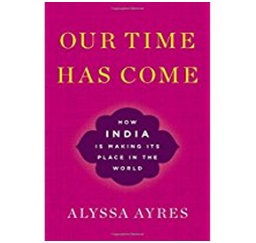 Abstract: In Our Time Has Come Alyssa Ayres looks at how the tension between India's inward-focused past and its ongoing integration into the global economy will shape its trajectory. Today, Indian leaders increasingly want to see their country feature in the ranks of the world's great powers-in fact, as a "leading power," to use the words of Prime Minister Narendra Modi. Ayres considers the role India is likely to play as its prominence grows, taking stock of the implications and opportunities for the US and other nations as the world's largest democracy defines its place in the world. As she shows, India breaks the mold of the typical "ally," and its vastness, history, and diversity render it incomparable to any other major democratic power. By focusing on how India's unique perspective shapes its approach to global affairs, Our Time Has Come will help the world make sense of India's rise Abstract: In Our Time Has Come Alyssa Ayres looks at how the tension between India's inward-focused past and its ongoing integration into the global economy will shape its trajectory. Today, Indian leaders increasingly want to see their country feature in the ranks of the world's great powers-in fact, as a "leading power," to use the words of Prime Minister Narendra Modi. Ayres considers the role India is likely to play as its prominence grows, taking stock of the implications and opportunities for the US and other nations as the world's largest democracy defines its place in the world. As she shows, India breaks the mold of the typical "ally," and its vastness, history, and diversity render it incomparable to any other major democratic power. By focusing on how India's unique perspective shapes its approach to global affairs, Our Time Has Come will help the world make sense of India's rise | | 18. Pakistan under siege: extremism, society, and the state / Afzal, Madiha - Washington: Brooking Institution Press, 2018 | 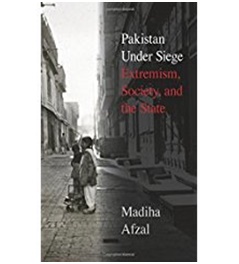 Abstract: Afzal traces this outlook to Pakistan’s unique and tortured birth. She examines the rhetoric and the strategic actions of three actors in Pakistani politics―the military, the civilian governments, and the Islamist parties―and their relationships with militant groups. She shows how regressive Pakistani laws instituted in the 1980s worsened citizen attitudes and led to vigilante and mob violence. The author also explains that the educational regime has become a vital element in shaping citizens’ thinking. How many years one attends school, whether the school is public, private, or a madrassa, and what curricula is followed all affect Pakistanis’ attitudes about terrorism and the rest of the world. Abstract: Afzal traces this outlook to Pakistan’s unique and tortured birth. She examines the rhetoric and the strategic actions of three actors in Pakistani politics―the military, the civilian governments, and the Islamist parties―and their relationships with militant groups. She shows how regressive Pakistani laws instituted in the 1980s worsened citizen attitudes and led to vigilante and mob violence. The author also explains that the educational regime has become a vital element in shaping citizens’ thinking. How many years one attends school, whether the school is public, private, or a madrassa, and what curricula is followed all affect Pakistanis’ attitudes about terrorism and the rest of the world. | | 19. Politics of cross national happiness: governance and development in Bhutan / Schroeder, Kent - New York: Palgarve Macmillan, 2018 |  Abstract: This book explores the practices of governance in Bhutan and how they shape the implementation of the country’s Gross National Happiness (GNH) development strategy. The author examines whether Bhutan’s innovative GNH governance framework successfully navigates competing power dynamics and generates the intended human development outcomes of Gross National Happiness. The analysis is structured around a comparison of the implementation of four GNH development policies – tourism, media, farm roads and human/wildlife conflict – and their larger implications on power, governance and the human development paradigm in Bhutan and beyond. Abstract: This book explores the practices of governance in Bhutan and how they shape the implementation of the country’s Gross National Happiness (GNH) development strategy. The author examines whether Bhutan’s innovative GNH governance framework successfully navigates competing power dynamics and generates the intended human development outcomes of Gross National Happiness. The analysis is structured around a comparison of the implementation of four GNH development policies – tourism, media, farm roads and human/wildlife conflict – and their larger implications on power, governance and the human development paradigm in Bhutan and beyond. | | 20. Power and water in central Asia / Menga, Filippo - London: Routledge, 2018 | 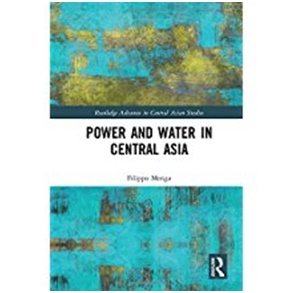 Abstract: This book analyses the role of state power in transboundary water relations. It provides an in–depth study of the evolution of interstate relations in Central Asia in the field of water from 1991-2015. Taking as a case study the planned construction of the Rogun and Kambarata dams in Tajikistan and Kyrgyzstan, the author examines various forms of overt and covert power shaping interstate relations and the way hegemonic and counter-hegemonic measures are put in place in an international river basin. He argues that the intimate correlation between the concepts of power and hegemony can offer key insights to the analysis and understanding of transboundary water relations. While the analytical focus is placed on state power, the book demonstrates that hegemonic and counter-hegemonic tactics represent the ways in which power is wielded and observed. Abstract: This book analyses the role of state power in transboundary water relations. It provides an in–depth study of the evolution of interstate relations in Central Asia in the field of water from 1991-2015. Taking as a case study the planned construction of the Rogun and Kambarata dams in Tajikistan and Kyrgyzstan, the author examines various forms of overt and covert power shaping interstate relations and the way hegemonic and counter-hegemonic measures are put in place in an international river basin. He argues that the intimate correlation between the concepts of power and hegemony can offer key insights to the analysis and understanding of transboundary water relations. While the analytical focus is placed on state power, the book demonstrates that hegemonic and counter-hegemonic tactics represent the ways in which power is wielded and observed. | | 21. PoK: origin and current scenario / Trivedi, Ajit K. Ajit K. Trivedi - Delhi: S.R. Book World, 2018 |  Abstract: This book contains Introduction or Azad Kashmir or Developments in POK and the Kashmir Valley or Indo Pak Relations and Kashmir Issue or Gilgit and Baltistan the Historical Dimension in POK etc. Abstract: This book contains Introduction or Azad Kashmir or Developments in POK and the Kashmir Valley or Indo Pak Relations and Kashmir Issue or Gilgit and Baltistan the Historical Dimension in POK etc. | | 22. Politics in North and South Korea: political development, economy, and foreign relations / Ku, Yangmo Yangmo Ku - London: Routledge, 2018 |  Abstract: Politics in North and South Korea provides students with a comprehensive understanding of the political dynamics of the two Koreas. Giving equal weight to North and South Korea, the authors trace the history of political and economic development and international relations of the Korean peninsula, showing how South Korea became democratized and how Juche ideology has affected the establishment and operation of a totalitarian system in North Korea. Abstract: Politics in North and South Korea provides students with a comprehensive understanding of the political dynamics of the two Koreas. Giving equal weight to North and South Korea, the authors trace the history of political and economic development and international relations of the Korean peninsula, showing how South Korea became democratized and how Juche ideology has affected the establishment and operation of a totalitarian system in North Korea. | | 23. The rise and fall of Korea's economic development: lessons for developing and developed economics / Jwa, Sung-Hee - New York: Palgarve Macmillan, 2017 |  Abstract: This book provides a unique and refreshing look at the Korean economy over the past 60 years. While most books and articles on the Korean economy would be technical or specifically address some aspect of Korea, this book takes an overarching view of Korea’s economic development. It assesses Korea’s economic take-off in the 1960s and 1970s, but also views the problems of ‘economic egalitarianism’ since the late-1980s to today. The book begins by listing and dispelling a number of important myths of the Korean economy and concludes by providing eight important ‘lessons’ derived from Korea’s experiences for developed as well as developing countries. Abstract: This book provides a unique and refreshing look at the Korean economy over the past 60 years. While most books and articles on the Korean economy would be technical or specifically address some aspect of Korea, this book takes an overarching view of Korea’s economic development. It assesses Korea’s economic take-off in the 1960s and 1970s, but also views the problems of ‘economic egalitarianism’ since the late-1980s to today. The book begins by listing and dispelling a number of important myths of the Korean economy and concludes by providing eight important ‘lessons’ derived from Korea’s experiences for developed as well as developing countries. | | 24. Rivers divided: indus basin waters in the making of India and Pakistan / Haines, Daniel - London: Hurst & Company, 2017 |  Abstract: The Indus Waters Treaty is considered a key example of India-Pakistan cooperation, but less has been said about its critical influence on state-making in both countries. Rivers Divided reveals the importance of the Indus Basin river system, and thus control over it, for Indian and Pakistani claims to sovereignty after South Asia's Partition in 1947. Securing water flows was a key aim for both governments. In 1960 the Indus Waters Treaty ostensibly settled the dispute, but in fact failed to address critical sources of tension. Examples include the role of water in the Kashmir conflict and the riverine geography of Punjab's militarised border zone. Despite the recent resurgence of disputes over water-sharing in South Asia, the historical causes and consequences of the region's flagship natural resources treaty remain little understood. Based on new research in South Asia, the United States and United Kingdom, this book places the Indus dispute, for the first time, in the context of decolonisation and Cold War-era development politics. It examines the discord at local, national and international levels, arguing that we can only explain its importance and longevity in light of India and Pakistan's state-building initiatives after independence. Abstract: The Indus Waters Treaty is considered a key example of India-Pakistan cooperation, but less has been said about its critical influence on state-making in both countries. Rivers Divided reveals the importance of the Indus Basin river system, and thus control over it, for Indian and Pakistani claims to sovereignty after South Asia's Partition in 1947. Securing water flows was a key aim for both governments. In 1960 the Indus Waters Treaty ostensibly settled the dispute, but in fact failed to address critical sources of tension. Examples include the role of water in the Kashmir conflict and the riverine geography of Punjab's militarised border zone. Despite the recent resurgence of disputes over water-sharing in South Asia, the historical causes and consequences of the region's flagship natural resources treaty remain little understood. Based on new research in South Asia, the United States and United Kingdom, this book places the Indus dispute, for the first time, in the context of decolonisation and Cold War-era development politics. It examines the discord at local, national and international levels, arguing that we can only explain its importance and longevity in light of India and Pakistan's state-building initiatives after independence. | | 25. The red star and the crescent: China and the middle east / Reardon-Anderson, James Ed. - London: Hurst & Company, 2018 |  Abstract: The Red Star and the Crescent provides an in-depth and multi-disciplinary analysis of the evolving relationship between China and the Middle East. Despite its increasing importance, very few studies have examined this dynamic, deepening, and multi-faceted nexus. James Reardon- Anderson has sought to fill this critical gap. Abstract: The Red Star and the Crescent provides an in-depth and multi-disciplinary analysis of the evolving relationship between China and the Middle East. Despite its increasing importance, very few studies have examined this dynamic, deepening, and multi-faceted nexus. James Reardon- Anderson has sought to fill this critical gap.
The volume examines the "big picture" of international relations, then zooms in on case studies and probes the underlying domestic factors on each side. Reardon- Anderson tackles topics as diverse as China's security strategy in the Middle East, its military relations with the states of the region, its role in the Iran nuclear negotiations, the Uyghur question, and the significance and consequences of the Silk Road strategy. | | 26. Resistance, power and conceptions of political order in Islamist organizations: comparing hezbollah and hamas / Koss, Maren - London: Routledge, 2018 |  Abstract: This book provides a comprehensive analysis of Islamist organizations' conceptions of political order based on a comparative case study of the Shiite Lebanese Hezbollah and the Sunni Palestinian Hamas. Connecting Islamism research, Critical Constructivist norm research, and resistance studies from the field of International Relations Theory, it demonstrates that resistance constitutes both organizations' core norm and is relevant for their conceptions of political order. Based on primary Arabic data the book illustrates that the core norm of resistance, deeply intertwined with both organizations' interactions towards power preservation and the specific political context they are engaged in, characterizes Hezbollah's and Hamas' respective conceptions of political order and explains the differences between them. I Abstract: This book provides a comprehensive analysis of Islamist organizations' conceptions of political order based on a comparative case study of the Shiite Lebanese Hezbollah and the Sunni Palestinian Hamas. Connecting Islamism research, Critical Constructivist norm research, and resistance studies from the field of International Relations Theory, it demonstrates that resistance constitutes both organizations' core norm and is relevant for their conceptions of political order. Based on primary Arabic data the book illustrates that the core norm of resistance, deeply intertwined with both organizations' interactions towards power preservation and the specific political context they are engaged in, characterizes Hezbollah's and Hamas' respective conceptions of political order and explains the differences between them. I | | 27. Resurgence of nuclear power: challenges and opportunities for Asia / Janardhanan, Nandakumar Ed. Edited by Nandakumar Janardhanan - London: Springer, 2017 | 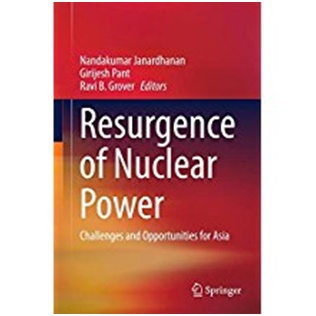 Abstract: This book focuses on the issue of ‘resurgence of nuclear power’ and discusses the feasibility of nuclear in the energy mix of Asian economies. It discusses nuclear energy sector in detail in the context of India, a country where currently overseas supply of hydrocarbon fuels plays a major role in meeting the domestic energy needs. The book presents an in-depth analysis of nuclear energy policy as well as regional and global politics surrounding the nuclear industry, and the relevance of nuclear energy from the low-carbon energy perspective. To do so, it explores three different perspectives. To start with, the resurgence of nuclear power is discussed from a global energy perspective to understand whether and how it has been increasingly gaining policy attention among Asian economies. Secondly, it highlights the role of nuclear power in Asia and examines how the collaboration with the global nuclear sector is influencing that role. Abstract: This book focuses on the issue of ‘resurgence of nuclear power’ and discusses the feasibility of nuclear in the energy mix of Asian economies. It discusses nuclear energy sector in detail in the context of India, a country where currently overseas supply of hydrocarbon fuels plays a major role in meeting the domestic energy needs. The book presents an in-depth analysis of nuclear energy policy as well as regional and global politics surrounding the nuclear industry, and the relevance of nuclear energy from the low-carbon energy perspective. To do so, it explores three different perspectives. To start with, the resurgence of nuclear power is discussed from a global energy perspective to understand whether and how it has been increasingly gaining policy attention among Asian economies. Secondly, it highlights the role of nuclear power in Asia and examines how the collaboration with the global nuclear sector is influencing that role. | | 28. Sino-Japanese relations in a trilateral context: origins of misperception / Zhang, Yun - New York: Palgarve Macmillan, 2017 | 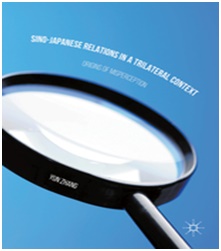 Abstract: This book explains the increasingly turbulent Sino–Japanese relations since the 2000s by innovatively investigating the formation mechanism of mutual misperception deeply rooted in China-Japan-U.S. trilateral structural dynamics. The political and security relationship has been increasingly deteriorating against the high interdependency between the world’s second and third largest economies. More ironically, both sides have also shown the intent and made efforts to improve bilateral ties. The author systematically conducts a focused comparison of the evolution of the Sino-Japanese mutual perceptions and policies toward one another during the past decade and a half. Empirically, Yun Zhang closely examines five case studies that provide insights to IR students and scholars and policy makers on how misperception and mistrust have formed, replicated, and intensified. Abstract: This book explains the increasingly turbulent Sino–Japanese relations since the 2000s by innovatively investigating the formation mechanism of mutual misperception deeply rooted in China-Japan-U.S. trilateral structural dynamics. The political and security relationship has been increasingly deteriorating against the high interdependency between the world’s second and third largest economies. More ironically, both sides have also shown the intent and made efforts to improve bilateral ties. The author systematically conducts a focused comparison of the evolution of the Sino-Japanese mutual perceptions and policies toward one another during the past decade and a half. Empirically, Yun Zhang closely examines five case studies that provide insights to IR students and scholars and policy makers on how misperception and mistrust have formed, replicated, and intensified. | | 29. South Korea at the crossroads: autonomy and alliance in era of rival powers / Snyder, Scott A. - New York: Columbia University Prees, 2018 | 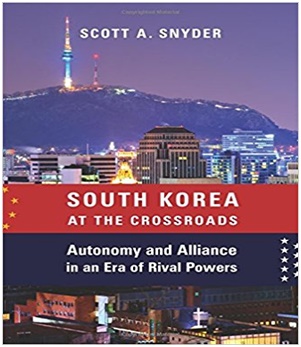 Abstract: Against the backdrop of China’s mounting influence and North Korea’s growing nuclear capability and expanding missile arsenal, South Korea faces a set of strategic choices that will shape its economic prospects and national security. In South Korea at the Crossroads, Scott A. Snyder examines the trajectory of fifty years of South Korean foreign policy and offers predictions―and a prescription―for the future. Pairing a historical perspective with a shrewd understanding of today’s political landscape, Snyder contends that South Korea’s best strategy remains investing in a robust alliance with the United States. Snyder begins with South Korea’s effort in the 1960s to offset the risk of abandonment by the United States during the Vietnam War and the subsequent crisis in the alliance during the 1970s. A series of shifts in South Korean foreign relations followed: the “Nordpolitik” engagement with the Soviet Union and China at the end of the Cold War; Kim Dae Jung’s “Sunshine Policy,” designed to bring North Korea into the international community; “trustpolitik,” which sought to foster diplomacy with North Korea and Japan; and changes in South Korea’s relationship with the United States. Abstract: Against the backdrop of China’s mounting influence and North Korea’s growing nuclear capability and expanding missile arsenal, South Korea faces a set of strategic choices that will shape its economic prospects and national security. In South Korea at the Crossroads, Scott A. Snyder examines the trajectory of fifty years of South Korean foreign policy and offers predictions―and a prescription―for the future. Pairing a historical perspective with a shrewd understanding of today’s political landscape, Snyder contends that South Korea’s best strategy remains investing in a robust alliance with the United States. Snyder begins with South Korea’s effort in the 1960s to offset the risk of abandonment by the United States during the Vietnam War and the subsequent crisis in the alliance during the 1970s. A series of shifts in South Korean foreign relations followed: the “Nordpolitik” engagement with the Soviet Union and China at the end of the Cold War; Kim Dae Jung’s “Sunshine Policy,” designed to bring North Korea into the international community; “trustpolitik,” which sought to foster diplomacy with North Korea and Japan; and changes in South Korea’s relationship with the United States. | | 30. Syria: the making and unmaking of refuge state / Chatty, Dawn - London: Hurst & Company, 2017 |  Abstract: The dispossession and forced migration of nearly 50 per cent of Syria's population has produced the greatest refugee crisis since World War II. This new book places the current displacement within the context of the widespread migrations that have indelibly marked the region throughout the last 150 years. Syria itself has harbored millions from its neighboring lands, and Syrian society has been shaped by these diasporas. Dawn Chatty explores how modern Syria came to be a refuge state, focusing first on the major forced migrations into Syria of Circassians, Armenians, Kurds, Palestinians, and Iraqis. Drawing heavily on individual narratives and stories of integration, adaptation, and compromise, she shows that a local cosmopolitanism came to be seen as intrinsic to Syrian society. She examines the current outflow of people from Syria to neighboring states as individuals and families seek survival with dignity, arguing that though the future remains uncertain, the resilience and strength of Syrian society both displaced internally within Syria and externally across borders bodes well for successful return and reintegration. If there is any hope to be found in the Syrian civil war, it is in this history. Abstract: The dispossession and forced migration of nearly 50 per cent of Syria's population has produced the greatest refugee crisis since World War II. This new book places the current displacement within the context of the widespread migrations that have indelibly marked the region throughout the last 150 years. Syria itself has harbored millions from its neighboring lands, and Syrian society has been shaped by these diasporas. Dawn Chatty explores how modern Syria came to be a refuge state, focusing first on the major forced migrations into Syria of Circassians, Armenians, Kurds, Palestinians, and Iraqis. Drawing heavily on individual narratives and stories of integration, adaptation, and compromise, she shows that a local cosmopolitanism came to be seen as intrinsic to Syrian society. She examines the current outflow of people from Syria to neighboring states as individuals and families seek survival with dignity, arguing that though the future remains uncertain, the resilience and strength of Syrian society both displaced internally within Syria and externally across borders bodes well for successful return and reintegration. If there is any hope to be found in the Syrian civil war, it is in this history. | | 31. The Silk Roads: A New History of the World Paperback / by Peter Frankopan – London: Bloomsbury, 2016 |  Abstract: Far more than a history of the Silk Roads, this book is truly a revelatory new history of the world, promising to destabilize notions of where we come from and where we are headed next. From the Middle East and its political instability to China and its economic rise, the vast region stretching eastward from the Balkans across the steppe and South Asia has been thrust into the global spotlight in recent years. Frankopan teaches us that to understand what is at stake for the cities and nations built on these intricate trade routes, we must first understand their astounding pasts. Frankopan realigns our understanding of the world, pointing us eastward. It was on the Silk Roads that East and West first encountered each other through trade and conquest, leading to the spread of ideas, Abstract: Far more than a history of the Silk Roads, this book is truly a revelatory new history of the world, promising to destabilize notions of where we come from and where we are headed next. From the Middle East and its political instability to China and its economic rise, the vast region stretching eastward from the Balkans across the steppe and South Asia has been thrust into the global spotlight in recent years. Frankopan teaches us that to understand what is at stake for the cities and nations built on these intricate trade routes, we must first understand their astounding pasts. Frankopan realigns our understanding of the world, pointing us eastward. It was on the Silk Roads that East and West first encountered each other through trade and conquest, leading to the spread of ideas, | | 32. Taiwan and China: fitful embrace / Dittmer, Lowell Ed. Edited by Lowell Dittmer - California: University of California Press, 2017 |  Abstract: China’s relation to Taiwan has been in constant contention since the founding of the People’s Republic of China in October 1949 and the creation of the defeated Kuomintang (KMT) exile regime on the island two months later. The island’s autonomous sovereignty has continually been challenged, initially because of the KMT’s insistence that it continue to represent not just Taiwan but all of China—and later because Taiwan refused to cede sovereignty to the then-dominant power that had arisen on the other side of the Taiwan Strait. One thing that makes Taiwan so politically difficult and yet so intellectually fascinating is that it is not merely a security problem, but a ganglion of interrelated puzzles. The optimistic hope of the Ma Ying-jeou administration for a new era of peace and cooperation foundered on a landslide victory by the Democratic Progressive Party, which has made clear its intent to distance Taiwan from China’s political embrace. The Taiwanese are now waiting with bated breath as the relationship tautens. Why did détente fail, and what chance does Taiwan have without it? Contributors to this volume focus on three aspects of the evolving quandary: nationalistic identity, social economy, and political strategy. Abstract: China’s relation to Taiwan has been in constant contention since the founding of the People’s Republic of China in October 1949 and the creation of the defeated Kuomintang (KMT) exile regime on the island two months later. The island’s autonomous sovereignty has continually been challenged, initially because of the KMT’s insistence that it continue to represent not just Taiwan but all of China—and later because Taiwan refused to cede sovereignty to the then-dominant power that had arisen on the other side of the Taiwan Strait. One thing that makes Taiwan so politically difficult and yet so intellectually fascinating is that it is not merely a security problem, but a ganglion of interrelated puzzles. The optimistic hope of the Ma Ying-jeou administration for a new era of peace and cooperation foundered on a landslide victory by the Democratic Progressive Party, which has made clear its intent to distance Taiwan from China’s political embrace. The Taiwanese are now waiting with bated breath as the relationship tautens. Why did détente fail, and what chance does Taiwan have without it? Contributors to this volume focus on three aspects of the evolving quandary: nationalistic identity, social economy, and political strategy. | | 33. Turkey: a modern history / Zurcher, Erik J. -- 4th Ed. - London: I. B. Tauris, 2017 |  Abstract: This revised edition builds upon and updates its twin themes of Turkey's continuing incorporation into the capitalist world and the modernization of state and society. It begins with the forging of closer links with Europe after the French Revolution, and the changing face of the Ottoman Empire in the 19th century. Zürcher argues that Turkey's history between 1908 and 1950 should be seen as a unity, and offers a strongly revisionist interpretation of Turkey's founding father, Kemal Atatürk. In his account of the period since 1950, Zürcher focuses on the growth of mass politics; the three military coups; the thorny issue of Turkey's human right's record; the alliance with the West and relations with the European Community; Turkey's ambivalent relations with the Middle East; the increasingly explosive Kurdish question; and the continuing political instability and growth of Islam. Abstract: This revised edition builds upon and updates its twin themes of Turkey's continuing incorporation into the capitalist world and the modernization of state and society. It begins with the forging of closer links with Europe after the French Revolution, and the changing face of the Ottoman Empire in the 19th century. Zürcher argues that Turkey's history between 1908 and 1950 should be seen as a unity, and offers a strongly revisionist interpretation of Turkey's founding father, Kemal Atatürk. In his account of the period since 1950, Zürcher focuses on the growth of mass politics; the three military coups; the thorny issue of Turkey's human right's record; the alliance with the West and relations with the European Community; Turkey's ambivalent relations with the Middle East; the increasingly explosive Kurdish question; and the continuing political instability and growth of Islam. | | 34. Transboundary water governance and international actors in South Asia : the Ganges-Brahmaputra-Meghan basin / Hanasz, Paula - London: Routledge, 2018 |  Abstract: This book identifies factors that contribute to water conflicts and that detract from water cooperation in this region. It sheds light on how international organisations affect these transboundary water interactions. The book discusses how donor-led initiatives can better engage with transboundary hydropolitics to increase cooperation and decrease conflict over shared freshwater resources. It is shown that there are several challenges: addressing transboundary water issues is not a top priority for the riparian states; there is concern about India’s hydro-hegemony and China's influence; and international actors in general do not have substantial support of the local elites. However, the book suggests some ways forward for improving transboundary water interaction. These include: addressing the political context and historical grievances; building trust and reducing power asymmetry between riparian states; creating political will for cooperation; de-securitising water; taking a problemshed view; strengthening water sharing institutions; and moving beyond narratives of water scarcity and supply-side solutions. Abstract: This book identifies factors that contribute to water conflicts and that detract from water cooperation in this region. It sheds light on how international organisations affect these transboundary water interactions. The book discusses how donor-led initiatives can better engage with transboundary hydropolitics to increase cooperation and decrease conflict over shared freshwater resources. It is shown that there are several challenges: addressing transboundary water issues is not a top priority for the riparian states; there is concern about India’s hydro-hegemony and China's influence; and international actors in general do not have substantial support of the local elites. However, the book suggests some ways forward for improving transboundary water interaction. These include: addressing the political context and historical grievances; building trust and reducing power asymmetry between riparian states; creating political will for cooperation; de-securitising water; taking a problemshed view; strengthening water sharing institutions; and moving beyond narratives of water scarcity and supply-side solutions. | | 35. Thin Dividing Line: India, Mauritius and Global Illicit Financial FlowsSep 20, 2017 / Thakurta, Paranjoy Guja and Jain, Shinzani – Gurgaon: Penguin, 2017 |  Abstract: The use of tax havens to not just avoid payment of taxes but also evade them has attracted considerable attention across the world and in India. Tax havens, also known as low-tax or no-tax jurisdictions, enable ultra-rich individuals and corporate entities, to not pay taxes, legally and illegally. There is a thin dividing line between tax avoidance (often described as good tax planning) and tax evasion (deemed criminal in most countries). In fact, the dividing line is so thin as to be virtually non-existent. Tax havens have been used by the rich and the powerful to benefit themselves at the expense of the poor and the underprivileged. This had led to widening inequality between citizens and across countries. This book looks at the India-Mauritius Double Taxation Avoidance Agreement in a global context of growing illicit financial flows. This agreement is important because 40 per cent of total inflows of foreign money into India comes through Mauritius. Also in the book, you will read about scandals around IPL, known international companies which came under scanner for tax evasion, black money, havala and an international criminal industry employing bankers, lawyers and corrupt bureaucrats who run an economy parallel to world economy. Abstract: The use of tax havens to not just avoid payment of taxes but also evade them has attracted considerable attention across the world and in India. Tax havens, also known as low-tax or no-tax jurisdictions, enable ultra-rich individuals and corporate entities, to not pay taxes, legally and illegally. There is a thin dividing line between tax avoidance (often described as good tax planning) and tax evasion (deemed criminal in most countries). In fact, the dividing line is so thin as to be virtually non-existent. Tax havens have been used by the rich and the powerful to benefit themselves at the expense of the poor and the underprivileged. This had led to widening inequality between citizens and across countries. This book looks at the India-Mauritius Double Taxation Avoidance Agreement in a global context of growing illicit financial flows. This agreement is important because 40 per cent of total inflows of foreign money into India comes through Mauritius. Also in the book, you will read about scandals around IPL, known international companies which came under scanner for tax evasion, black money, havala and an international criminal industry employing bankers, lawyers and corrupt bureaucrats who run an economy parallel to world economy. | | 36. Tribes and global Jihadism / Collombier, Virginie Ed. and Roy, Olivier - London: Hurst & Company, 2017 | 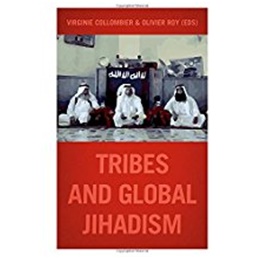 Abstract: Across the Muslim world, from Iraq and Yemen, to Egypt and the Sahel, new alliances have been forged between the latest wave of violent Islamist groups ---- -including Islamic State and Boko Haram ---- -and local tribes. But can one now speak of a direct link between tribalism and jihadism, and how analytically useful might it be? Abstract: Across the Muslim world, from Iraq and Yemen, to Egypt and the Sahel, new alliances have been forged between the latest wave of violent Islamist groups ---- -including Islamic State and Boko Haram ---- -and local tribes. But can one now speak of a direct link between tribalism and jihadism, and how analytically useful might it be?
Tribes are traditionally thought to resist all encroachments upon their sovereignty, whether by the state or other local actors, from below; yet by joining global organizations such as Islamic State, are they not rejecting the idea of the state from above? This triangular relationship is key to understanding instances of mass 'radicalization', when entire communities forge alliances with jihadi groups, for reasons of self-interest, self-preservation or religious fervor. If Algeria's FIS or Turkey's AKP once represented the 'Islamization of nationalism', have we now entered a new era, the 'tribalization of globalization'? | | 37. Taliban narratives: the use and power of stories in the Afghanistan conflict / Johnson, Thomas H. - London: Hurst & Company, 2017 |  Abstract: Why has the Taliban been so much more effective in presenting messages that resonate with the Afghan population than the United States, the Afghan government and their allies? This book, based on years of field research and the assessment of hundreds of original source materials, examines the information operations and related narratives of Afghan insurgents, especially the Afghan Taliban, and investigates how the Taliban has won the information war. Taliban messaging, wrapped in the narrative of jihad, is both to the point and in tune with its target audiences. On the other hand, the United States and its Kabul allies committed a basic messaging blunder, failing to present narratives that spoke to or, often, were even understood by their target audiences. Thomas Johnson systematically explains why the United States lost this "battle of the story" in Afghanistan, and argues that this defeat may have cost the US the entire war, despite its conventional and technological superiority. Abstract: Why has the Taliban been so much more effective in presenting messages that resonate with the Afghan population than the United States, the Afghan government and their allies? This book, based on years of field research and the assessment of hundreds of original source materials, examines the information operations and related narratives of Afghan insurgents, especially the Afghan Taliban, and investigates how the Taliban has won the information war. Taliban messaging, wrapped in the narrative of jihad, is both to the point and in tune with its target audiences. On the other hand, the United States and its Kabul allies committed a basic messaging blunder, failing to present narratives that spoke to or, often, were even understood by their target audiences. Thomas Johnson systematically explains why the United States lost this "battle of the story" in Afghanistan, and argues that this defeat may have cost the US the entire war, despite its conventional and technological superiority. | | 38. The theory of ISIS: political violence and the transformation of the global order / Mohamedou, Mohammad-Mahmoud Ould - London: Pluto Press, 2018 |  Abstract: The Islamic State of Iraq and Syria has been the subject of intense scrutiny in the West. Considered by many to be the most dangerous terrorist organisation in the world, it has become shrouded in numerous myths and narratives, many emanating from the US, which often fail to grasp its true nature.*BR**BR*Against these narratives, Mohammad-Mahmoud Ould Mohamedou presents a bold new theory of ISIS. By tracing its genealogy and documenting its evolution in Iraq and Syria, he argues that ISIS has transcended Osama Bin Laden’s original project of Al Qaeda, mutating into an unprecedented hybrid form that distils postcolonial violence, postmodernity and the emerging post-globalisation international order.*BR**BR*This book analyses ISIS from a social sciences perspective and unpacks its dynamics by looking beyond superficial questions such as its terrorist nature and religious rhetoric. It transforms our understanding of ISIS and its profound impact on the very nature of contemporary political violence. Abstract: The Islamic State of Iraq and Syria has been the subject of intense scrutiny in the West. Considered by many to be the most dangerous terrorist organisation in the world, it has become shrouded in numerous myths and narratives, many emanating from the US, which often fail to grasp its true nature.*BR**BR*Against these narratives, Mohammad-Mahmoud Ould Mohamedou presents a bold new theory of ISIS. By tracing its genealogy and documenting its evolution in Iraq and Syria, he argues that ISIS has transcended Osama Bin Laden’s original project of Al Qaeda, mutating into an unprecedented hybrid form that distils postcolonial violence, postmodernity and the emerging post-globalisation international order.*BR**BR*This book analyses ISIS from a social sciences perspective and unpacks its dynamics by looking beyond superficial questions such as its terrorist nature and religious rhetoric. It transforms our understanding of ISIS and its profound impact on the very nature of contemporary political violence. | | 39. Uunlikely partners?: China, the European Union and the forging of a strategic partnership / Michalski, Anna and Pan, Zhongqi - New York: Palgarve Macmillan, 2017 |  Abstract: This book provides an in-depth analysis of the relations between China and the EU, tracing the development of this complex, yet intriguing, relationship between two substantially different actors. To uncover a deeper understanding of this unlikely partnership, the authors analyze the partnership through the prism of contending norms and worldviews. The China-EU strategic partnership has evolved through fits and starts but despite continuous trade disputes and severe diplomatic misunderstandings, the EU and China pledge to uphold, even deepen, the partnership. Policy experts and scholars will learn how such contending bilateral relationships can be managed and establish a better understanding of deep-seated conceptual differences between these two entities. Abstract: This book provides an in-depth analysis of the relations between China and the EU, tracing the development of this complex, yet intriguing, relationship between two substantially different actors. To uncover a deeper understanding of this unlikely partnership, the authors analyze the partnership through the prism of contending norms and worldviews. The China-EU strategic partnership has evolved through fits and starts but despite continuous trade disputes and severe diplomatic misunderstandings, the EU and China pledge to uphold, even deepen, the partnership. Policy experts and scholars will learn how such contending bilateral relationships can be managed and establish a better understanding of deep-seated conceptual differences between these two entities. | | 40. Upcountry tales: once upon a time in the heart of India / Tully, Mark - New Delhi: Speaking Tiger, 2017 | 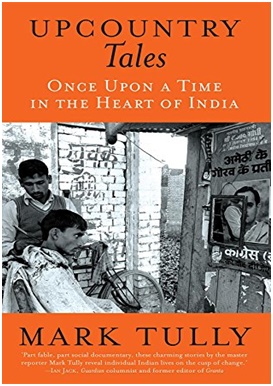 Abstract: For over fifty years, Mark Tully has been one of the most celebrated observers of Indian politics and society. In this collection, he returns to the territory of his acclaimed and bestselling work of fiction, The Heart of India, to bring us stories from the end of an era—a time that preceded the economic liberalization of 1991, when India was at a crossroads; and a time that may not be as firmly in the past as we imagine. Set in the villages of eastern Uttar Pradesh during the second half of the 1980s, these stories are about memorable people—unlikely rebels, delightful pragmatists, bunglers and bumblers, quiet heroes—finding ways to deal with bad governance, corruption and social hierarchies. A timid, elderly Dalit challenges tradition to build a temple to Sant Ravi Das; a clear-headed, clever farmer’s wife saves her family from her husband’s follies; a former headmistress leads the battle to save an endangered railway line; a politician’s son learns what it means ‘to eat the dust of UP’; a peaceable, comfort-loving policeman defies political pressure to solve a murder; an agnostic becomes a monk. Abstract: For over fifty years, Mark Tully has been one of the most celebrated observers of Indian politics and society. In this collection, he returns to the territory of his acclaimed and bestselling work of fiction, The Heart of India, to bring us stories from the end of an era—a time that preceded the economic liberalization of 1991, when India was at a crossroads; and a time that may not be as firmly in the past as we imagine. Set in the villages of eastern Uttar Pradesh during the second half of the 1980s, these stories are about memorable people—unlikely rebels, delightful pragmatists, bunglers and bumblers, quiet heroes—finding ways to deal with bad governance, corruption and social hierarchies. A timid, elderly Dalit challenges tradition to build a temple to Sant Ravi Das; a clear-headed, clever farmer’s wife saves her family from her husband’s follies; a former headmistress leads the battle to save an endangered railway line; a politician’s son learns what it means ‘to eat the dust of UP’; a peaceable, comfort-loving policeman defies political pressure to solve a murder; an agnostic becomes a monk. |
|
|
| |
|
|
|
|
|
|